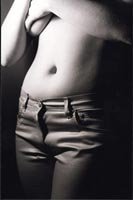A Better Poet Than President
Roses are red
Violets are blue
Oh my, lump in the bed
How I've missed you.
Roses are redder
Bluer am I
Seeing you kissed
by that charming French guy.
The dogs and the cat, they missed you too
Barney's still mad you dropped him, he ate your shoe
The distance, my dear, has been such a barrier
Next time you want an adventure, just land on a carrier.
Added - Dec 30, 2003. This was not by Bush although Laura originally said it was. At this time the author is unknown. Is the whole family addicted to lying?
Poetry and song and maybe culture

Saturday, October 11, 2003
Bohemian Poet Samuel Menashe
Considering the significant recognition that he has received from other poets, he has remained remarkably unknown. "The public career of Samuel Menashe demonstrates how a serious poet of singular talent, power and originality can be largely overlooked in our literary culture," Mr. Gioia writes.
In his essay Mr. Gioia offers several reasons, especially the brevity of Mr. Menashe's poems, which generally finish within 10 lines. It has not helped that he has been a throwback, preferring not to teach or to work at a literary publication. "He has lived a bohemian life in an age of academic institutionalism," Mr. Gioia observed.
Lines from Tenement Spring
There is a pillow
On the window sill —
Her elbow room —
In the twin window
Enclosed by a grill
Plants in pots bloom
On the window sill
When he arrived on Thompson Street 47 years ago, romantic notions of artistic purity prevailed, still reminiscent of Anatole Broyard's description of the area just after World War II:
"Rents were cheap, restaurants were cheap, and it seemed to me that happiness itself might be cheaply had," Mr. Broyard wrote in "Kafka Was the Rage," his Greenwich Village memoir. "The streets and bars were full of writers and painters and the kind of young men and women who liked to be around them. In Washington Square would-be novelists and poets tossed a football near the fountain, and girls just out of Ivy League colleges looked at the landscape with art history in their eyes."
Mr. Menashe expresses no nostalgia for those bygone days; in some ways he's still living in them. "It's very poetic, the bathtub is in the kitchen," he said ruefully. "But if I had any foresight I'd now be the owner of a proper middle-class apartment."
At a Standstill
That statue, that cast
Of my solitude
Has found its niche
In this kitchen
Where I do not eat
Where the bathtub stands
Upon cat feet —
I did not advance
I cannot retreat
Winter - a war poem
I am entrenched
Against the snow,
Visor lowered
To blunt its blow
I am where I go
Family Silver
That spoon fell out
Of my mother's mouth
Before I was born,
But I was endowed
With a tuning fork
Promised Land
At the edge
Of a world
Beyond my eyes
Beautiful
I know Exile
Is always
Green with hope —
The river
We cannot cross
Flows forever
This continues the occasional great article on poetry in the book section of The New York Times.
Considering the significant recognition that he has received from other poets, he has remained remarkably unknown. "The public career of Samuel Menashe demonstrates how a serious poet of singular talent, power and originality can be largely overlooked in our literary culture," Mr. Gioia writes.
In his essay Mr. Gioia offers several reasons, especially the brevity of Mr. Menashe's poems, which generally finish within 10 lines. It has not helped that he has been a throwback, preferring not to teach or to work at a literary publication. "He has lived a bohemian life in an age of academic institutionalism," Mr. Gioia observed.
Lines from Tenement Spring
There is a pillow
On the window sill —
Her elbow room —
In the twin window
Enclosed by a grill
Plants in pots bloom
On the window sill
When he arrived on Thompson Street 47 years ago, romantic notions of artistic purity prevailed, still reminiscent of Anatole Broyard's description of the area just after World War II:
"Rents were cheap, restaurants were cheap, and it seemed to me that happiness itself might be cheaply had," Mr. Broyard wrote in "Kafka Was the Rage," his Greenwich Village memoir. "The streets and bars were full of writers and painters and the kind of young men and women who liked to be around them. In Washington Square would-be novelists and poets tossed a football near the fountain, and girls just out of Ivy League colleges looked at the landscape with art history in their eyes."
Mr. Menashe expresses no nostalgia for those bygone days; in some ways he's still living in them. "It's very poetic, the bathtub is in the kitchen," he said ruefully. "But if I had any foresight I'd now be the owner of a proper middle-class apartment."
At a Standstill
That statue, that cast
Of my solitude
Has found its niche
In this kitchen
Where I do not eat
Where the bathtub stands
Upon cat feet —
I did not advance
I cannot retreat
Winter - a war poem
I am entrenched
Against the snow,
Visor lowered
To blunt its blow
I am where I go
Family Silver
That spoon fell out
Of my mother's mouth
Before I was born,
But I was endowed
With a tuning fork
Promised Land
At the edge
Of a world
Beyond my eyes
Beautiful
I know Exile
Is always
Green with hope —
The river
We cannot cross
Flows forever
This continues the occasional great article on poetry in the book section of The New York Times.
Subscribe to:
Comments (Atom)
